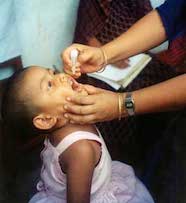Polio, also known as poliomyelitis, is a highly infectious viral illness which can cause lasting damage to the nervous system, including paralysis. Children are most vulnerable but people of any age can contract the virus.
The first vaccines were developed in the 1950s and 1960s and polio is now highly preventable. There is, however, no cure and so prevention of transmission through vaccination is the only way to reduce the long-lasting health effects of polio.
A global effort to eradicate polio began in 1998 and the New Zealand Paediatric Surveillance Unit contributes to this goal through monitoring acute flaccid paralysis, one of the effects of polio, in New Zealand. In 2023, there were 12 reported cases in the world. Afghanistan and Pakistan are the only remaining countries where polio is endemic.
In November 2022, WHO advised of an increase in polio activity in areas which have previously seen polio eradicated (Mozambique). This is partly because of global decline in immunisation rates, including in New Zealand.
In 2023 Manatū Hauora published a new National Poliomyelitis Response Framework, responding to the heightened risk of poliovirus globally. The National Poliomyelitis Response Framework provides a toolkit for how Aotearoa would respond to various scenarios in which there was detection of polio, including a polio outbreak, in New Zealand.
In 2023, ESR (Institute of Environmental Science and Research) and Manatū Hauora established routine poliovirus testing in waste water following a successful three-month study. Wastewater testing complements existing polio surveillance, including our national reporting of patients with Acute Flaccid Paralysis. Wastewater surveillance is part of a broader move by Te Whatu Ora – Health New Zealand, Te Aka Whai Ora – Māori Health Authority, and Manatū Hauora – the Ministry to review our national polio preparedness including surveillance, case identification, testing and notification, and planning.
In New Zealand, polio vaccination is provided as part of the childhood vaccination schedule. It is also available free of charge for adults who were not vaccinated as children. New Zealanders who are travelling to areas where polio is present should have a booster vaccine if more than 10 years have passed since their last polio vaccination. There is a charge for booster vaccinations.
Read more about the global polio eradication initiative
For more information on polio vaccination in New Zealand, see the Te Whatu ora website

A child receiving polio vaccine drops in Bangladesh